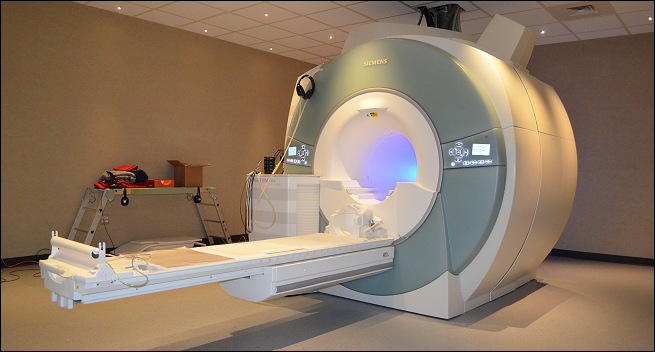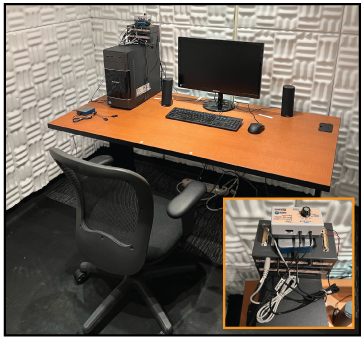MRI
The Maryland Neuroimaging Center (MNC) is a world-class brain imaging facility located approximately 5 minutes from the center of campus. The MNC is easily accessible by private car and public transportation (from campus as well as neighboring institutions, such as the NIH campus and the University of Maryland Schools of Medicine & Dentistry) and there is ample parking on-site. The facility provides access to multiple techniques, including MEG, high-density EEG, and simultaneous fMRI/EEG. The MNC includes multiple meeting rooms and a data analysis laboratory. The facility includes a state-of-the-art Siemens 3T Prisma scanner with 12-, 32-, and 64-channel head coils for performing high-resolution structural (T1, DTI) and functional (BOLD EPI, ASL) MRI studies, including multi-band sequences. A real-time fMRI system provides an on-line estimate of subject motion, enabling the operator to monitor and provide on-going feedback to the subject or optionally re-collect a scan. Real-time multiband fMRI is enabled by a high-performance, dedicated reconstruction server (Nvidia Tesla K40C GPU; 2,880 cores) linked to the scanner via 10-Gb optical Ethernet. The MNC provides in-house access to the full array of stimulus presentation software (Eprime, NBS Presentation, PsychoPy, PsychToolBox) and hardware (fiber optic response pads; MRI-compatible joystick, pneumatic audio delivery devices; MRI-compatible shocker [Biopac STMEPM-MRI System]), peripheral physiology apparatus (Biopac MP-150 for EKG, EDA/GSR, EMG), and eye-tracking (MRI-compatible SR Research Eyelink 1000; 2,000Hz monocular/1,000Hz binocular sampling; 0.01º RMS spatial resolution). The eye tracker enables the operator to verify task engagement and troubleshoot potential subject discomfort or fatigue. The MNC has a mock scanner and other rooms for interacting with subjects and their families (e.g., screening, administration of behavioral assays and psychometric instruments).

A recently re-developed Behavioral Testing & Training (BTT) Suite is earmarked for use by the ATNL (video walk-through). The Suite encompasses a commons area and 2 private offices (total: ~290 square-feet), and is equipped with a laptop computer, desktop computer, software for self-report assessments and behavioral training/testing, and a Biopac electrical stimulator (inset photo). The 3-button mouse is similar to that used in the MRI scanner. The BTT Suite makes it possible to prepare, train, and assess participants outside of the MRI suite, maximizing scheduling flexibility and volume, while reducing logistical bottlenecks and billable hours.
The MNC is directed by Dr. Luiz Pessoa. The MNC staff includes a full-time MRI physicist, Dr. Wang Zhan, administrator, and several MRI operators. The MNC is affiliated with the university’s interdepartmental neuroscience training program (NACS) and is overseen by an executive committee comprised of the director, staff, and other campus faculty. More information: http://www.mnc.umd.edu/
Computing
The ATNL is equipped with multiple engineering-grade laptops and workstations (Intel 8th-generation multi-threaded processors; 8-32 GB RAM; 512 GB to 1 TB local storage; high-end graphic cards; Windows 10 or RedHat Enterprise and virtual Windows 7) with dual LCD monitors to accommodate the needs of lab staff and trainees. Additional laptops and tablets are available for use at the imaging center, teaching, or conference travel. Workstations are equipped with a full array of software for statistical analysis of MRI imaging data including Matlab, SPM, FSL, AFNI, MRICRON, and ANTS. In addition, commonly used productivity software is available on all machines, including the Adobe suite (Acrobat Pro, Illustrator, Photoshop), Microsoft Office, R, and SPSS; as well as a specialized commercial software for experiment design and analysis (e.g., E-Prime, NBS Presentation, Biopac Acknowledge, and SR Research Dataviewer). All workstations are password protected using campus log-on credentials with multi-factor authentication and are regularly administered by our staff scientist and 2 full-time Department IT administrators.
For cutting-edge data analyses, the lab is equipped with 4 Linux-based servers (“Badger:” 2 x 8-core Intel Xeon E5-2660 chips, 128 GB RAM, ZFS RAID with 9 x 3 TB storage; “Fisher” and “Polecat:” 2 x 10-core Intel Xeon E5-2640 chips; 128 GB RAM; ZFS RAID with 9 x 4 TB storage; “Sable:” 2 x 18-core Xeon Gold 6254 chips; 192 GB RAM; ZFS RAID with 14 x 3.8 TB SSD storage and 3,584 CUDA GPU cores). The servers are housed off-site in the secure campus Research Data Center and regularly administered by our staff scientist and the Enterprise Technical Infrastructure group within the Office of Information Technology (OIT). Using the server, imaging, psychophysiological (e.g., SCR), and behavioral (e.g., eyetracking) data can be processed and analyzed using AFNI, ANTS, BSE, FSL, MATLAB, MRICRON, ROBEX, and SPM12. The lab also has a powerful, expandable, custom workstation (“Ferret”) for complex data analyses (2 x 4-core Intel Xeon E5-2637 processor; 128 GB RAM; ZFS RAID with 8 x 4 TB storage and 2,304 CUDA GPU cores).
